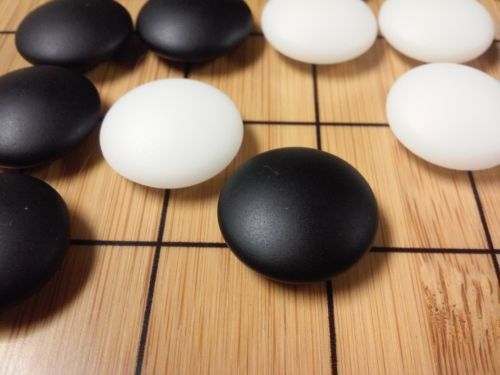Interested in Go—but concerned about the ancient tales and whispers on the street regarding its complexity? Is the question of, “Is Go A Hard Game To Learn How To Play” on your mind? If so, you can rest easy knowing that learning the game is not as hard as you might have been led to believe.
Go (Weiqi in Chinese) is arguably one of the simplest games—but also the most complex. Confusing, right? As we’ll discuss in this article, the difficulty of the game is subject to how you look at. But in a nutshell, learning to play the board game is fairly simple. The rules are straightforward and easy to grasp. What continues to trouble even the most experienced and talented players is the depth of the game.
“Go is science, art and game. Those chosen few may enter the Eternal Hall of Fame only, who combine the scientific precision, the artistic improvisation and the spiritual joy of the game in themselves.”
Kajiwara Takeo, celebrated professional Go player

For over 2,500 years, the subtle allure and intellectual depths of the East Asian strategy board game have drawn the admiration of ancient aristocrats and modern intellectuals alike. In fact, Go is regarded as one of the four essential arts of the Chinese Scholar. And according to Confucius—one of history’s greatest philosophers— “Gentlemen should not waste their time on trivial games — they should study Go.”
So, what exactly makes Go an easy—yet hard game? Read on to find out.
Perspective A: Go is an Easy Game to Learn – The Black and White Basics
All factors considered; Go is as easy as a board game can get. You’ll have an easier time learning Go than most other games—including chess. You only need to look at the rules to understand its simplicity. Here’s a breakdown of the rules.
- Unlike chess—which has 6 unique pieces with different abilities—Go only has 1 piece. You either get a set of black or white stones on an N x N grid (e.g., the 19 x 19 full board or the 9 x 9 beginner board).
- Like any other typical game, the primary objective is to earn more points than your opponent. This is determined by the number of pieces you captured and your territory.
- A territory is formed when you place your stones on vacant positions on the board—while captures are made when you surround the opponent’s stones completely on all liberties. (PS: Stones are placed on intersections—rather than on the middle of the square as seen in chess or checkers).
- If you claim more intersections than your opponent or capture more pieces than you lose, then you’ve won. Simple, right?
- With the rules dialed down, the next step is to play through feel or intuition.
To answer the article’s main question; Go is NOT hard to learn! It’s both literary the figuratively the epitome of the phrase ‘black-and-white’ (i.e., it is easy to understand). If you are interested in learning Go, here is a quality board and stones at a bargain price.

It only takes a few minutes to learn the fundamentals, pick up a board, and start playing. So why do professional Go players train for years?
Perspective B: Go is a Hard Game to Learn – The Fascinating Depth of the Board Game
While it’s clear that anyone who cares to learn—even children—can easily grasp the rules, playing to win is whole other beast. Go is characteristically one of the most complex board games in existence.
Deceptively Simple
The idea of capturing a stone is clear as day (i.e. just surround it completely)—but doing so is easier said than done. There are hundreds of different ways or strategies to thwart capture attempts while launching your own attacks. And as the game stretches on, this branches out to an enormous search tree with more possibilities than you can comprehend. Your short-term tactics (i.e., immediate set of moves) have a profound impact on how your stones will fit in the long-term.
A Skill-Intensive Game
It demands a certain level of skill and luck to traverse the near-infinite possible moves. Firstly, you need to balance your defense and attack. Secondly, you must accurately analyze the play to recognize the opponent’s strengths and shortcomings. Lastly, you should remain flexible in changing situations and strategize your timing.
Practice, Practice, Practice
The fact that a typical professional Go player begins apprenticeship in their childhood and trains for several years goes to show the complexity of the game. It’s even not uncommon for a single professional game to drag on for days.

The Role of Intuition in Go
The chances of having two identical games are staggeringly low—if even possible. The astronomical number of possible moves means that exhaustively evaluating and strategizing your play is simply wishful thinking—which is where intuition comes into play.
A Game Computers Couldn’t Beat
For a while, Go puzzled the tech world—and was quoted by Google as the “one game has thwarted A.I. research.” According to the tech giant, Go is of profound complexity with possibilities that exceed the number of atoms in the observable universe (1082). Consider this: A full-size 19 x 19 board has 361 points—which brings the number of possible games to 10700. It was not until 2016 that an AI system (Google’s AlphaGo) was able to beat a Go Master. For this, the AI system had to incorporate complex methodologies that are comparable to “the experience of someone playing the game for 80 years straight.”
Takeaway on Go Being A Hard Game To Learn
As one user on Quora put it, the concept of Go is similar to physics. The rules are clear-cut and simple (e.g. E = mc2). You can easily memorize formulas and explain fundamental principles.
The challenge arises when you try to put the equations/rules to use. You soon realize that the implications are far-reaching and it’s all about conceptualization. For example, Einstein’s theory of special relativity (E = mc2) has profound implications—including explaining the color of Gold, the behavior of planets, to predicting the existence of black holes.
But regardless of how easy it’s to learn Go or how hard it is to play, one thing’s certain: it’s an immensely satisfying game. Anyone who appreciates board or strategy games will have a thoroughly good time waging war against the black or white opponents.
